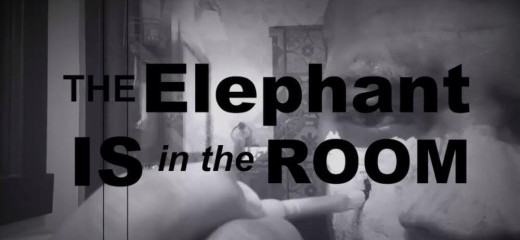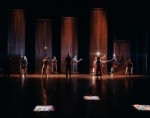
The Message and Method Behind a Most Timely Work
by Darcy Grabenstein
“The Elephant Is in the Room” is a deep collaboration between three passionate artists: choreographer Ronen (Roni) Koresh, founder and artistic director of Philadelphia’s Koresh Dance Company; Karl Mullen, a wordsmith and multidisciplinary artist in Massachusetts; and Raphael Xavier, a breaker and multifaceted artist based in Philly, who dances in the film alongside Zane Booker and Rennie Harris . The film, part of a trilogy of short dance films directed by Koresh, is described as “a visceral response to our troubled America, hate crimes, and our cry for change. #BLM.” I interviewed the artists about the film.
Darcy Grabenstein: Roni, what prompted you to create the video trilogy? Was there a “last straw” or was it a culmination of societal events?
Roni Koresh: The awareness of what’s been going on for many, many years. It was there all along. I think the whole time of this pandemic, and sitting there reflecting. When you have the time and you’re watching, especially that George Floyd incident. I was sent to the ’50s and the ’40s and the ’60s. And I immediately called Karl. When he sent me the poem, let me tell you, I was frightened.
Do you call them poems, Karl?
Karl Mullen: Not really, because I have great respect for poets and I’m not a poet. I just say words. I don’t write them down, I make them up.
It was quite spontaneous. It was just a gut response, like most sane people all over the world responding to the death of George Floyd. It was just so troubling, so upsetting and so endemic of the racism in this country.
RK: There is such reality that hurts. And there are people who live in ignorance and don’t want to see things as they are. It’s scary. I’m the one in the public eye, and I’m going to be the one putting it out there. It was really scary.
Raphael Xavier: You’ve got a guy who’s about to catch heat for something and he’s not African-American.
KM: Roni, did you get any heat?
RK: Surprisingly, no.
DG: Raphael, do you feel that “The Elephant Is in the Room” did justice to the issues of hate crimes and racial discrimination?
RX: I don’t feel that Roni was trying to do racial discrimination justice. It’s impossible. But the subtleties of a topic like this are just as important. Overdoing the subject is easy. It’s not about the dance, it’s about the expression. So I felt what I did wasn’t enough. It was me expressing how I felt through Karl’s words.
DG: Raphael, in a broader sense, do you think a non-Black person can adequately depict the pain and suffering unique to the Black experience, regardless of the art form?
RX: To some extent, I do. Some people completely disagree with me. Obviously, these two are not African-Americans. But they feel something here as human beings. Regardless of what color you are, you know that situation was not right. You wouldn’t do a dog that way and be OK with it. When you look at it, ultimately it is a Black and white thing. There’s no way that you, as a non-African-American, can understand what an African-American has gone through or goes through. But I’m not the only one. Zane [Booker] is not the only one, Rennie [Harris] is not the only one who feels something about this situation. So, yes, it’s totally possible. It’s not only surface Black and white. It’s much deeper than that.
RK: Every culture has gone through real serious, troubling times in history. And I think if you’re sensitive enough you can relate to the history of your people. And then seeing this happen all over again to somebody else is very troubling.
RX: One of the most interesting and misunderstood topics for me that has surrounded hip-hop dance has been cultural appropriation. What has the Black man created that the white person hasn’t taken and run with?
Here you’ve got an Israeli dude, non-Black, who’s going to talk about a subject that Black people should be talking about. I don’t think it’s a problem. This is the moment for Black people to be seen and stand for something that needs to be addressed.
RK: I feel like we’re living in the most important times in the history of this country.
DG: Raphael, do you find that dance is cathartic for you? Does it provide an outlet for your emotions?
RX: I wouldn’t say it’s an outlet for emotion, it’s an outlet almost for therapy. The way I move as a breaker comes from another space. It’s in the moment but it doesn’t come from that moment. It comes from moments in my experience that led me up to that particular moment in time.
I can perform to no music, just sound or the environment and I love that because I hear things that I can latch onto that push me in another direction, unknowingly. Listening to Karl, there were certain things that I thought I could run with. Roni said just let it happen. Tears just started rolling. It wasn’t a forced moment.
DG: Karl, like dance, your words have a definite rhythm. How would you compare the two artistic mediums?
KM: I’m a musician and a visual artist so certainly rhythm and pattern and repetition interest me. You can give texture and meaning in the sound of a voice. The notion that spoken voice is music and somehow if you dance to it, it gives you a context and an atmosphere and a texture.
RK: They call you The Voice. The voice is just so soothing around you.
RX: Sometimes we hear something and are looking for a particular pattern or rhythm and it’s not there. But the timbre is there. That’s the tone of what you’re listening to, and it’s very different from a cadence. There’s no cadence in Karl’s work. It’s the soundscape, the thoughtscape … you’re listening to a task of thought. I love that. It causes me to react, respond. My movement has that sound concept of what timbre is. As soon as he opens his mouth, he’s got you hooked.
DG: Roni, I found it interesting that a Philadanco T-shirt is featured in the film. What kind of relationship do you have with other dance companies in the Greater Philadelphia area?
RK: Philadanco, a Black company, how more appropriate can it be? I have a wonderful relationship with other directors of companies. If you go into certain genres in dance, the ballet world is a very competitive world. It has a hierarchy. I never wanted that. I wanted equality. That’s why we created the [Come Together Dance] Festival, to create a place so everybody can flourish, everybody gets an opportunity to be seen. To me, it’s all about being in a community. Philadelphia is unique in that sense. I think now, because of the pandemic, there’s a lot more closeness. Because we’re in it together.
DG: Roni, how has your choreography process shifted with social distancing?
RK: I don’t pre-choreograph. When I was younger, I used to write down every count in the music. I was afraid to look stupid in front of my dancers. If you look stupid, they might not follow you after a while. You earn their respect … then you can do whatever you want and they’ll just do it.
I’m doing these films to stay sharp and use my brain. I’m working on a few more. One is called “The Light at the End of the Tunnel.” I haven’t started it yet because of the limitation of not being in the room with the dancers and the fact that they can’t touch. It’s very difficult. I also took a piece that Karl gave me a few years ago, “Aftershock.” It will be part of “The Elephant Is in the Room.” When I listen to it now, it takes on a whole different meaning. You think about slavery. It’s not so much dance. It’s more of an artistic thing with Dougie Styles, an incredible tapper.
DG: How has the pandemic impacted your celebration of 30 years at Koresh Dance?
RK: You have no idea. I have a complete work, a prequel to the 30th anniversary called The Muse, celebrating [assistant artistic director and dancer] Melissa Rector, who has been with me since the company’s inception. It was supposed to be performed in May, along with Here and Now. So that didn’t happen. We have been streaming full works, and I’ve been doing Q&As on Sunday. So there has been a presence representing the company’s achievements, longevity, content, and mission. We’re hoping by next year things will be different. I think we’ll get out of it, just how many scars? How much makeup will we need?
RX: 2020 has been a reset button, and starting over is never easy.
The Elephant Is in the Room, Koresh Dance Company. Words and voice by Karl Mullen. Performed by Rennie Harris, Raphael Xavier, and Zane Booker. Edited by Rennie Harris, Sandy Mitchel. Directed by Ronen Koresh.
By Darcy Grabenstein
August 12, 2020








